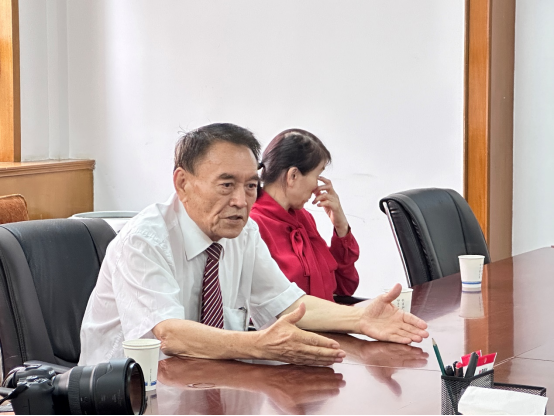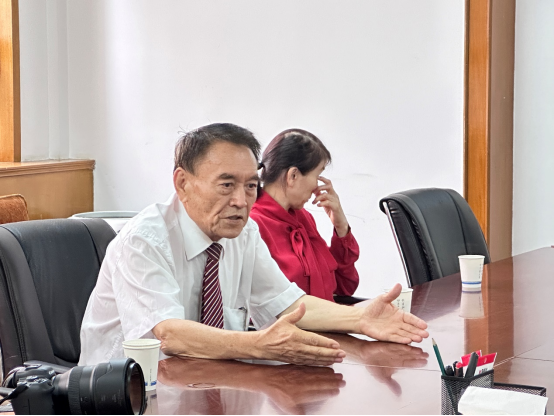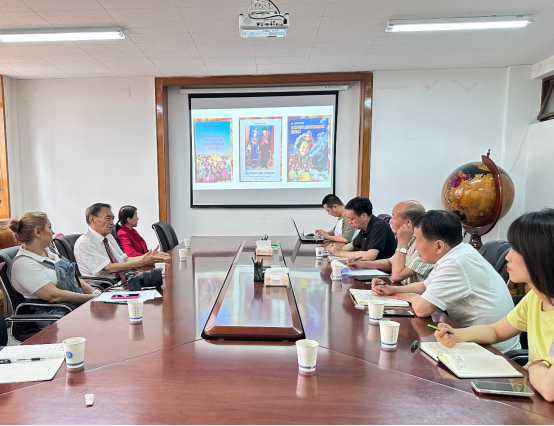Bai Dongshan, President of Donggan Cultural Center of Uzbekistan, was Invited to Visit the School of Chinese Literatures and Languages of Lanzhou University
On the afternoon of July 11, Bai Dongshan (SAVUROV MANE DAVUROVICH ), President of Donggan Cultural Center of Uzbekistan, was invited to visit the School of Chinese Literatures and Languages of Lanzhou University and had a discussion with some teachers and students of the School of Chinese Literatures and Languages in Conference Room 315 of Yifu Liberal Arts Building. Professor Zhang Jin, Professor Yang Jianjun, Lecturer Qiao Xue, International Exchange Secretary Xi Xiaofei, and doctoral student Shivala, master students Li Junfang, Ma Yan who are majored in literary theory, and other teachers and students of the School of Arts participated in the discussion and exchange, which was presided over by Vice Dean Guo Maoquan.

Vice Dean Guo Maoquan, on behalf of the School of Chinese Literatures and Languages, extended a warm welcome to President Bai Dongshan and hoped that Lanzhou University and the Donggan ethnic group of Uzbekistan would cooperate and strengthen their ties in cultural exchanges between China and Uzbekistan and international Chinese education.

At the symposium, President Bai Dongshan introduced the main contents of 10 books he edited and published, such as “The Mystery of the Cooking Technique of the Donggan People”, “the Family of the Donggan People”, and “the Dress of the Donggan People”, and gave a detailed introduction to the folk culture of the Donggan people in Uzbekistan. He introduced the development of the Donggan people in recent years, and talked about the historical origin between the Donggan people and the customs and culture in western China, especially in Shaanxi and Gansu regions. He mentioned that the Donggan ethnic character, population, living habits, customs and etiquette, planting crops, naming methods are closely related to Chinese culture, for example, they like to eat hand-pulled noodles, dumplings, steamed buns, eat using chopsticks and so on.

Bai Dongshan took the wedding of the Donggan people as an example to describe the traditional wedding customs of the Donggan people and explore the close connection between these customs and Eastern culture.The Donggan wedding is a “living fossil”that records the history of Donggan, for example, the bride must wear embroidered shoes, wind her hair, wear a red skirt gown embroidered with dragon and phoenix patterns, and the groom wears a long gown and jacket, wears a melon cap, and wears red brocade on the chest. In addition, Bai Dongshan also introduced the influence of Donggan vocabulary on Russian vocabulary, introduced the profound significance of this special Chinese variant in cultural inheritance and exchange, and conveyed the recognition of Chinese civilization.
During the discussion, Professor Zhang Jin and Professor Yang Jianjun exchanged views on the population distribution of Donggan people, the origin of ethnic names, cultural changes and vegetable planting. This symposium allowed everyone to have a deeper understanding of the unique charm of Donggan culture, provided a new perspective and new materials for understanding the cultural exchanges along the Silk Road, and discussed the multi-field, deep and all-round cooperation that can be carried out in the next step. It is believed that this symposium will further promote the cooperation and exchanges between the School of Chinese Literatures and Languages of Lanzhou University and the Donggan Cultural Center of Uzbekistan.
It is reported that SAVUROV MANE DAVUROVICH (Bai Dongshan), born in 1949, doctor of history, Uzbek anthropologist and collector. In 1973, he graduated from the Department of History of Tashkent State University, majoring in anthropology. In 1986, he received a doctorate degree from the Institute of Anthropology of Leningrad (now St. Petersburg) of the Soviet Academy of Sciences. He has long been committed to the study of Donggan culture and the cultural and educational exchanges between China and Uzbekistan, and has received Chinese delegations to visit Donggan Village in Uzbekistan for many years. He has edited and published 10 books such as “The Mystery of Donggan Cooking Technology” and published more than 100 papers. He has participated in various academic conferences in Beijing, Xi ’an, Tashkent, Moscow, Tokyo and other cities. He was once a senior researcher at the Institute of History of the Uzbek Academy of Sciences. He is currently the chairman and president of the Donggan Cultural Center of Uzbekistan.
